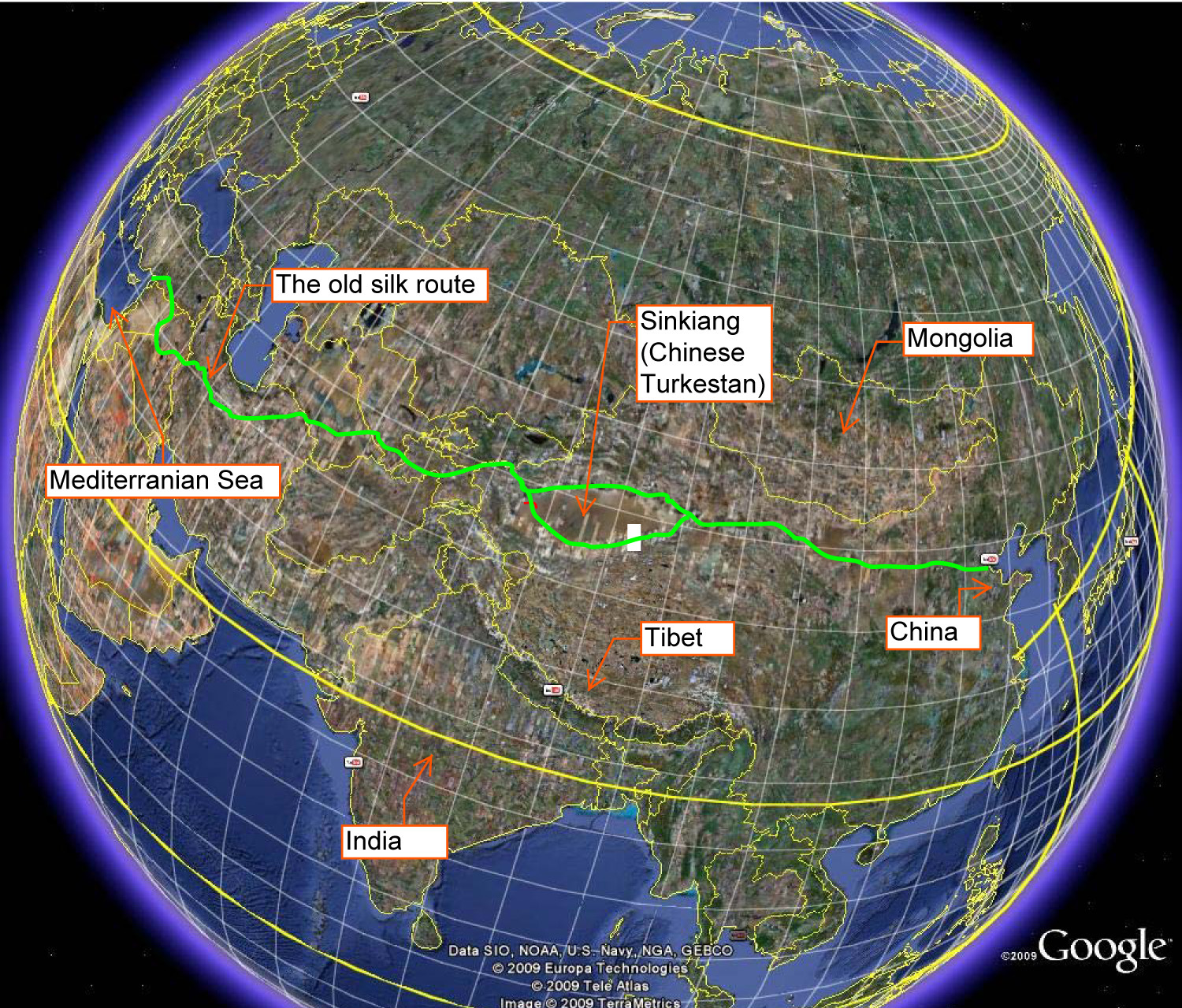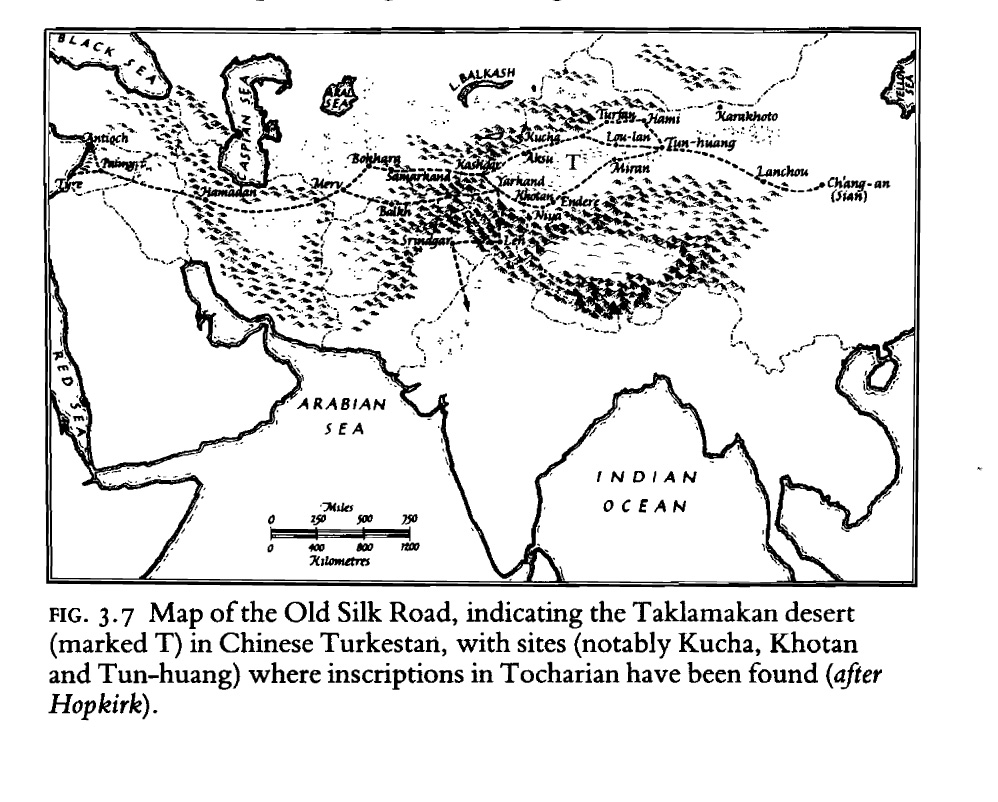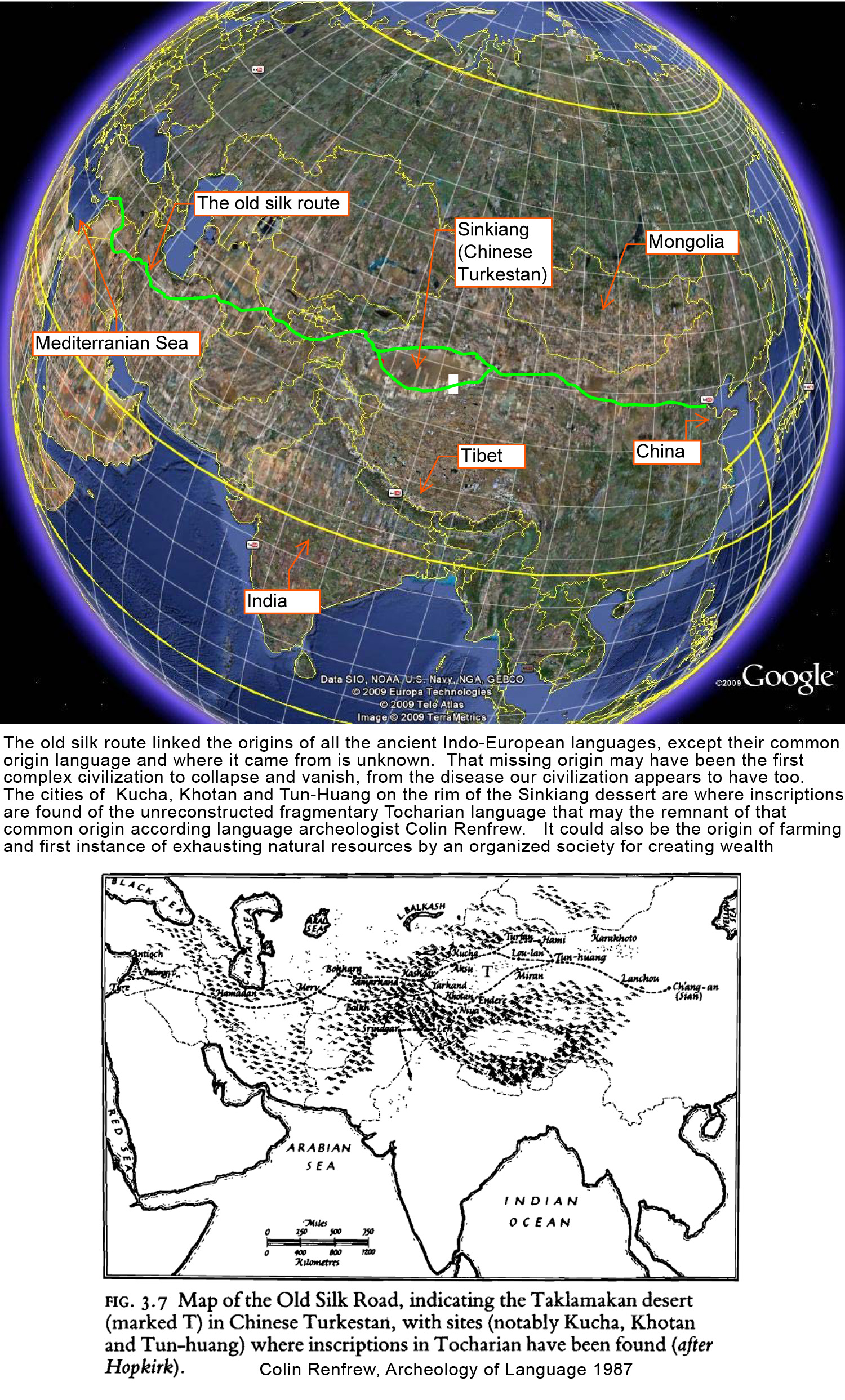Einstein, Keynes, Boulding,
Jacobs .....
clues to
the
ancient struggle, between the natural physical world and human information and belief
may lie along the path of the old silk route:
-- why historians can't find the first complex
society, where the mother tongue of western thought developed, and then vanished without a trace...
-- compared to the view from our own collapsing
tower of Babel, looking back in time and place
of the first one.
[i.e. looking back to that important milestone in mankind’s emerging long battle with
the hazards of superstition and magical thinking]
2/17/09 (first save - partial draft), 11/14/10 (smoothing)
Why in the 20th century modern man built the wrong economic system
for its future, and now needs to deal with having run out cheap resources, and so out of
credit and materials with which to remake it into a better one, can be summed up as a popular idea winning out
over a practical one. It seems to put on display our long and great struggle
between the two ideas of reality. Is there a physical
world beyond our explanations, or just a world of explanations? That's the
question.
I came to my own very simple and clear resolution that the
world works better when considered as having both, both a world of meanings and
a world for meaning and explanation to explore, partly with the help of Einstein, Keynes & Boulding, all of whom
ended up being dismissed by the more popular intellectuals of their fields, who
went on to establish the form of science for the later 20th century, and our
model of applying technology to develop the earth. The "winners" of
science built our world around a model of nature as
being our explanations, a matter of information, not stuff. It was the
popular 'main stream' intellectuals who called Keynes idea of the climax of
capitalism (1) that Boulding also upheld (2),
"the fallacy" and described Einstein's idea that "God does not throw dice" as
"naive and immature", notably Niels Bohr, Heisenberg and Schrödinger, with many
many followers in many fields, who began a worship of Quantum Mechanics as a
justification for believing that reality was composed purely of our information,
and the world must necessarily be considered as operated by the explanations in our minds.
It was a perfect fit with our economic culture of endless growth as a model of
stability, as simply great and perfect idea.
"the struggle between the two great ideas of reality"
 Indeed!
how else could one explain it? Well, the far more
practical way. If that matters, of course, the more practical way is to accept physical reality as something that
needs exploring, but not explaining. Our ideas about it
may need explaining, of course, but reality never does. That is the
view that was firmly dismissed and disparaged in the popular new consensus of modern science, and so made unavailable in the debates on what to do with the
vast power of modern technology. Becoming so absorbed with
data and rules, losing sight of there being a world of independently responding
things beyond explanation,
becomes responsible for our building this odd and inexplicably unsustainable
world. We designed it to become ever more reliant on using up scarce resources.
Indeed!
how else could one explain it? Well, the far more
practical way. If that matters, of course, the more practical way is to accept physical reality as something that
needs exploring, but not explaining. Our ideas about it
may need explaining, of course, but reality never does. That is the
view that was firmly dismissed and disparaged in the popular new consensus of modern science, and so made unavailable in the debates on what to do with the
vast power of modern technology. Becoming so absorbed with
data and rules, losing sight of there being a world of independently responding
things beyond explanation,
becomes responsible for our building this odd and inexplicably unsustainable
world. We designed it to become ever more reliant on using up scarce resources.
That easy but impractical leap of faith, that nature is our dream, also becomes responsible for our following the inexplicably unsustainable single
rule and design principle of maximizing the accelerating speed of
development, trying to stabilize adding by %'s, a perpetual explosive expansion
as our idea of 'growth', instead of growth toward creating a comfortable new home on earth. If physical reality
doesn't exist, and the only "reality" is your own ideas of it, a maximum
rate of growth
in wealth is clearly the best choice you can explain!
All
the popular "main stream" thinkers agreed, that the best of all choices would be
to maximize the % rate of increasing profits for the people making the choices!If they were the least bit embarrassed by the curious self-serving quality of
that, they hid it well in other explanations. Now, with the
collapse, we are finding out just how misguided that plan was, steering our peak
century of economic development only with maximum accelerating expansion.
Now we end up with more than a little to explain, of course, as to how we
managed to think that way, and what looks like a painful long term process of
triage.
 Why
did we use up our resources building a world that would run out of
gas, and we'd need to rebuild to maintain our culture? Well,
hopefully, it was so we'd finally figure out what doesn't need explaining, but
exploring. This 'debate', or more aptly 'struggle with our own
minds' about what is real and what is imagination, seems to have been going on
since humans first had imaginations. I've looked at some of the cultural,
anthropological and paleontological records to try to figure out when that was,
and to try to imagine the circumstances. The early horizon of human
culture and our history of abstract thinking is being pushed back to 77,000 years now, with evidence of
symbolic scratches in ochre as evidence (3). I think
the evidence is that complex human culture, and so abstract thinking too, go
back considerably further. To me the expressiveness of our
faces, quality of our vocal chords in making sound, and the freedom of
expression in our body movements to dance, indicates we had a lot to say very
long ago, perhaps to the earliest of distinctly human ancestors,
either 1 or 4 million years ago depending on how you look at that.
Why
did we use up our resources building a world that would run out of
gas, and we'd need to rebuild to maintain our culture? Well,
hopefully, it was so we'd finally figure out what doesn't need explaining, but
exploring. This 'debate', or more aptly 'struggle with our own
minds' about what is real and what is imagination, seems to have been going on
since humans first had imaginations. I've looked at some of the cultural,
anthropological and paleontological records to try to figure out when that was,
and to try to imagine the circumstances. The early horizon of human
culture and our history of abstract thinking is being pushed back to 77,000 years now, with evidence of
symbolic scratches in ochre as evidence (3). I think
the evidence is that complex human culture, and so abstract thinking too, go
back considerably further. To me the expressiveness of our
faces, quality of our vocal chords in making sound, and the freedom of
expression in our body movements to dance, indicates we had a lot to say very
long ago, perhaps to the earliest of distinctly human ancestors,
either 1 or 4 million years ago depending on how you look at that.
So rather than blame abstract thinking, I
think the better sign of the time when we began to confuse conceptual
thinking and reality is when that became a serious problem. When we got so good at conceptual
thinking we could get completely lost in it, and started to build great
societies that collapsed. That's seems to be one common thread tying
together all the leading explanation for why complex civilizations collapse,
that our way of expert problem solving has often somehow created problems our
civilizations couldn't solve.
I think we run into problems we can't solve by trusting the world in our minds more
than the one on which we depend (4) and recognizing both
realities would help.
Perhaps the first of these great disappearances of complex technological
societies coincides with the missing link between the several scattered
Indo-European languages Indian/Iranian, Armenian, Hittite, Greek, Italic,
Slavonic, Germanic, Albanian, Baltic & Celtic plus an "outlier" with
no daughter languages, named Tocharian. What is clear is that the western
language group had a common root, the origin of western sentence structure and
arithmetic. That first civilization where complex societies and their
great failures originated is apparently "missing", to be called only Indo-European.
Scattered details allow one to speculate that the common origin might have been
in the isolated urban cultures where the great dessert of Sinkiang is now,
presently some of the most forbidding and unfrequented terrain along the
original silk route between the Mediterranean and China. For this I
had some help from Jane Jacobs, the urban anthropologist and critic.
There are a
series of oases along the south edge of the dessert, fed by water from the Altyntagh Mountains where thriving urban cultures appear to have come and gone
over and over, along that first "interstate highway" of ancient civilization.
That makes it a perfect setting for the original crucible of urban design and
social technology, born in the way speculated about by Jane Jacobs, with her
surmise that such trading villages were where the first "killer app" of the
social organization and machine technology, systemized farming, was developed
(5). What brings attention to that particular
dessert and it's fringe is that it is where inscriptions in an extinct language
were found, seeming to have elements of the other Indo-European languages, that none
of the others have in common. The so called 'Tocharian'
language (though probably misnamed) could then be a remnant of the missing common
origin of the Indo-European languages (6).
Whatever the common origin of the otherwise disconnected roots of the great ancient western
languages, it seems it did vanish without trace and produced a great scattering
of others that became western culture. That seems like a perfect fit,
though just speculation really, if it was also the first case of an advanced
human civilization to fail dramatically, producing a tower of Babble and self-destruction
from
it's own organizing principles. So many other advanced civilizations
have come and gone since, many apparently from some disease of their own notable
success. It's original mother tongue was implicitly the language of the first
major western civilization, and implicitly the first major complexly organized society,
leaving its trace by disappearing without a trace, except for it's scattered
descendants.
1) JM Keynes 1935 The General Theory of Employment Interest and Money. Ch 16
2) Kenneth Boulding 1950 A Reconstruction of Economics. Ch 17
3) Michael Balter. 2009 The origin of Art and Symbolism. Science p709-711
2/6/09
4) Alfred Toynbee said "people run into problems they can't solve" and JA
Tainter (1988 The Collapse of Complex Societies) described several
vanished complex societies that persisted with strategies having diminishing
returns that had started with multiplying returns.
5) Jane Jacobs 1968 The Economy of Cities, 2000 The Nature of Economies
6) Collin Renfrew 1987 Archeology of Language, describes the search for the
origins for the common link between the major Indo-European languages

Synapse9
jlh
 Indeed!
how else could one explain it? Well, the far more
practical way. If that matters, of course, the more practical way is to accept physical reality as something that
needs exploring, but not explaining. Our ideas about it
may need explaining, of course, but reality never does. That is the
view that was firmly dismissed and disparaged in the popular new consensus of modern science, and so made unavailable in the debates on what to do with the
vast power of modern technology. Becoming so absorbed with
data and rules, losing sight of there being a world of independently responding
things beyond explanation,
becomes responsible for our building this odd and inexplicably unsustainable
world. We designed it to become ever more reliant on using up scarce resources.
Indeed!
how else could one explain it? Well, the far more
practical way. If that matters, of course, the more practical way is to accept physical reality as something that
needs exploring, but not explaining. Our ideas about it
may need explaining, of course, but reality never does. That is the
view that was firmly dismissed and disparaged in the popular new consensus of modern science, and so made unavailable in the debates on what to do with the
vast power of modern technology. Becoming so absorbed with
data and rules, losing sight of there being a world of independently responding
things beyond explanation,
becomes responsible for our building this odd and inexplicably unsustainable
world. We designed it to become ever more reliant on using up scarce resources.
 Why
did we use up our resources building a world that would run out of
gas, and we'd need to rebuild to maintain our culture? Well,
hopefully, it was so we'd finally figure out what doesn't need explaining, but
exploring. This 'debate', or more aptly 'struggle with our own
minds' about what is real and what is imagination, seems to have been going on
since humans first had imaginations. I've looked at some of the cultural,
anthropological and paleontological records to try to figure out when that was,
and to try to imagine the circumstances. The early horizon of human
culture and our history of abstract thinking is being pushed back to 77,000 years now, with evidence of
symbolic scratches in ochre as evidence (3). I think
the evidence is that complex human culture, and so abstract thinking too, go
back considerably further. To me the expressiveness of our
faces, quality of our vocal chords in making sound, and the freedom of
expression in our body movements to dance, indicates we had a lot to say very
long ago, perhaps to the earliest of distinctly human ancestors,
either 1 or 4 million years ago depending on how you look at that.
Why
did we use up our resources building a world that would run out of
gas, and we'd need to rebuild to maintain our culture? Well,
hopefully, it was so we'd finally figure out what doesn't need explaining, but
exploring. This 'debate', or more aptly 'struggle with our own
minds' about what is real and what is imagination, seems to have been going on
since humans first had imaginations. I've looked at some of the cultural,
anthropological and paleontological records to try to figure out when that was,
and to try to imagine the circumstances. The early horizon of human
culture and our history of abstract thinking is being pushed back to 77,000 years now, with evidence of
symbolic scratches in ochre as evidence (3). I think
the evidence is that complex human culture, and so abstract thinking too, go
back considerably further. To me the expressiveness of our
faces, quality of our vocal chords in making sound, and the freedom of
expression in our body movements to dance, indicates we had a lot to say very
long ago, perhaps to the earliest of distinctly human ancestors,
either 1 or 4 million years ago depending on how you look at that.
